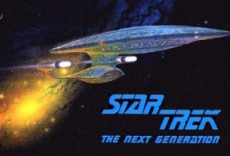When Star Trek: The Next Generation (STNG) first came out, it was shiny, high tech, and a million times more polished than the original series — which although still classic, was looking awful dated. STNG just felt more futuristic, and glossy.
 Now, of course, it looks almost as silly as the original. The special effects and props look obviously fake, and the crude CG in the credits could be more convincingly animated by any 10th grader today, with a decent computer. But despite its age, and the campiness that time has foisted upon it, something still happens to me when the model Enterprise creeps across the star-lit screen. When Patrick Stewart’s noble, classically trained voice narrates the Captain’s Log setting up the episode’s cold open, and then the theme music soars in triumphantly, it still inspires — over two decades since the show first came out — a sense of wonder, at the scope of what we don’t know.
Now, of course, it looks almost as silly as the original. The special effects and props look obviously fake, and the crude CG in the credits could be more convincingly animated by any 10th grader today, with a decent computer. But despite its age, and the campiness that time has foisted upon it, something still happens to me when the model Enterprise creeps across the star-lit screen. When Patrick Stewart’s noble, classically trained voice narrates the Captain’s Log setting up the episode’s cold open, and then the theme music soars in triumphantly, it still inspires — over two decades since the show first came out — a sense of wonder, at the scope of what we don’t know.
Star Trek captures adventure and a spirit of hope that I think influences the politics and ideals of most sci-fi fans — maybe more than we recognize. Its a collective dream about a time, some day in the distant future, when petty quarrels about health care are long since solved, and wars over resources or ideals are a distant embarrassing memory, because people have long since learned how to solve these things without violence. When each individual’s contribution to society is toward pursuing an exciting and challenging unknown together.
Its unfortunate that we don’t live in the world that Gene Roddenberry imagined — one which likely looks a lot more like the one God intended for his kids, than what we’ve muddled ourselves into. Its unfortunate that our technological research leads us to more efficient killing machines, instead of toward the vast galaxy that God made for us to explore and learn. Its unfortunate that such sci-fi is the realm of geeks and nerds, and maybe a few ridiculous idealists, who understand that the future should hold excitement and adventure, not fear and uncertainty. Its unfortunate that so many people are so terrified of cultures different from their own, that they could never function in the kind of cross-cultural environment that the creators of Star Trek so carefully illustrated.
And, with TV shows starting back-up again this fall, its unfortunate that there’s no one out there doing anything remotely like Star Trek, and Star Trek: The Next Generation. When I recently settled into my couch to re-watch a campy episode of the final season of STNG, I couldn’t help but wonder what it would be like if people could just stop arguing selfishly — if we were driven not by greed, but a pure sense of wonder at the majesty of God’s handy work — and set our minds on truly appreciating the scope of the universe God made for us, and the companions he created to explore it with us…




Especially the “Q” episodes. Judging human-kind for our past (and present) actions. I know what you mean about the hope that STNG represents.
It’s funny that I was thinking the same things about the original STrek… it was amazingly “haha” in the realm of campiness – even 10 years after it was made…
The thing I find funny in STNG is that although they are totally peaceful – almost no volence on the planet – they created a federation that builds phasers, star ships and other such “killer ideas” when they are out in space… hmmm. Not quite the utopia that they portray – rotfl.
However, I think that whatever we believe heaven will be like – it will be infinitely better!
Both the original Star Trek and STNG were extended metaphors for how the world dealt with what was ‘alien’ on earth. The Klingons with their heirarchal leadership structure and their ‘sneaky’ technology were clearly the Russians, and Kirk was the consummate American in his abiding hatred of them that lasted until that hatred was exposed and parodied in “The Undiscovered Country.”
STNG suffered by having no clearly identifiable villan, the Romulans never able to mount a significant menance, and the Ferengi – a mockery of capitalist ideology – never amounting to more than comic relief.
Voyager, on the other hand, after a shaky two years, found its groove, and a sizable new market, with Seven-of-Nine, a character that allowed them to explore the truly terrifying future that a soulless technology that was indifferent to human aspirations presented. Although later emasculated in the movies, the Borg of the television series came closest to touching the nerve of our collective unconsciousness about the things that truly frighten us as a species: the loss of our identity and our hope.
Bilbo, you’re talking about the Original Series movies, which is where the Klingons were really developed as bad guys. They barely played into the the TV series.
And I don’t think STNG suffered at all, from their lack of villains (except the Borg, who were awesome!) It allowed many more of their shows to be morality plays…
Voyager, on the other hand, was never interesting. Neelix == Jar Jar Binks.
And Brooke, yes we are, and you love us!
I dunno about Next Gen, I always preferred Kirk’s hit ’em with a styrofoam rock approach to diplomacy. Give the man a huge starship fitted with phasers and torpedoes, and he always seemed to find an excuse to roll around in the dirt, tear his shirt and hit someone with a rock. That and tribbles, loved the tribbles.
And to the “other” Dave, stop using my name dag-nab-it!
are we really friends?
LOL
Ok, got to take you on about the “never interesting.” I agree that Neelix was a pain, that is why his character was minimized in later years. But Voyager had some interesting stuff, not the least being that its two principals were women.
In a space future dominated by guys exploring the outer limits of their egos, here was a series that dealt with a very current issue of women in positions of authority and how those lines of authority were interpreted by others.
It also dealt with the developing relationship between two women that wasn’t based on sexual competition for men or inane ideas of ‘sisterhood’. Janeway was compassionate without being indecisive, and Seven-of-Nine’s barely constrained contempt for human weakness a refreshing indictment of simplistic mannerisms posing as meaningful gestures.
The really great thing about this series is that it is not done, the last movie being one of the best. I can’t wait to see how they are going to play out this new interpretation of the characters, although I fear that Uhuru will never rise above a mere ‘comfort and support’ role. Why Hollywood is so afraid of strong independent women I will never pretend to understand.